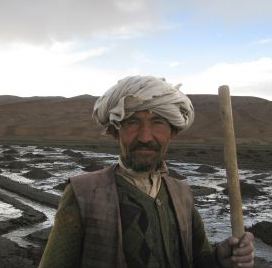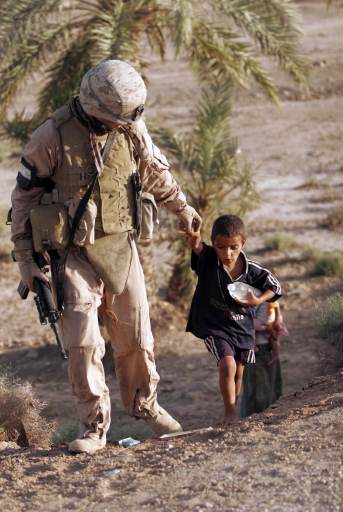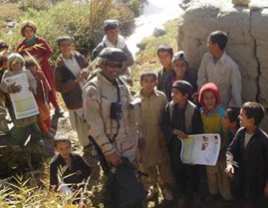 National Guard troops from a half-dozen heartland states are taking their civilian farming know-how to Afghanistan in a little-noticed aspect of the Obama administration’s efforts to stabilize the war-torn country.
National Guard troops from a half-dozen heartland states are taking their civilian farming know-how to Afghanistan in a little-noticed aspect of the Obama administration’s efforts to stabilize the war-torn country.
About 400 Guard troops from six states — Indiana, Kansas, Missouri, Nebraska, Tennessee and Texas — are serving 11-month tours in Afghanistan as part of special “agricultural development teams” that are teaching Afghans how to improve their farming techniques. Six other states — California, Florida, Iowa, Kentucky, Oklahoma and South Carolina — will send similar teams to Afghanistan by the end of the year, according to Guard officials. (Photo, right, shows Afghan potato farmer, by Julie Fossler, USAID)
Pioneered by the Missouri National Guard in 2007, the teams are intended to improve relations with the Afghan people and give a boost to Afghanistan’s agriculture-dependent economy.
Farming accounts for more than a third of Afghanistan’s gross domestic product of $23 billion annually, and nearly three-fourths of all Afghans rely on farming for their income, even though only about 12 percent of the land in the mountainous country is arable. But Afghan farming techniques are considered primitive compared with those in the United States.
Guard officials hope the agricultural teams can build trust among the Afghan people and, by helping develop the battle-scarred country, improve the fragile security situation there. President Obama has made stabilizing Afghanistan one of his chief foreign objectives, and about 68,000 U.S. troops are now stationed there.
Guard leaders also hope that by teaching Afghan farmers more effective ways to grow local crops such as wheat, rice, nuts and fruit, the teams will discourage them from growing opium, which produces heroin, fuels the international drug trade and helps finance Afghanistan’s Taliban-led insurgency. In 2007, 93 percent of the world’s opium was produced in Afghanistan, according to the U.S. State Department.
Military officials say that Guard troops — who usually work full-time jobs as civilians until they are called into active duty by their governors or by the president — are uniquely prepared to carry out the agricultural development mission. Only the Guard and reserves offer both practical agricultural experience and combat-zone readiness, supporters of the teams say.
 “It absolutely epitomizes the citizen soldier concept that the National Guard is all about,” said Charlie Kruse, president of the Missouri Farm Bureau, an advocacy group that lobbies on behalf of Missouri farmers. His is one of several non-governmental organizations that have provided financial and other support to the agricultural teams. Kruse served in the Missouri Guard for 26 years.
“It absolutely epitomizes the citizen soldier concept that the National Guard is all about,” said Charlie Kruse, president of the Missouri Farm Bureau, an advocacy group that lobbies on behalf of Missouri farmers. His is one of several non-governmental organizations that have provided financial and other support to the agricultural teams. Kruse served in the Missouri Guard for 26 years.
State land-grant universities also are lending a hand. Agriculture professors at Purdue University in West Lafayette, Ind., for example, have provided specialized training to National Guard teams from Indiana, Tennessee and Texas prior to their deployments.
Kruse and the outgoing head of the Army National Guard, Lt. Gen. Clyde Vaughan, another veteran of the Missouri Guard, first pitched the idea of the teams to Pentagon leaders in 2007. Since then, the teams have won praise at the highest levels of the military. In an interview with Stateline.org at the Pentagon last month, Gen. Craig McKinley, a four-star general who heads the National Guard Bureau, called the agricultural development initiative “one that I’m just as high on as I can be.”
The Guard’s teams usually are composed of about 60 soldiers and airmen, many with experience as commercial farmers in the United States and all of them volunteers for the mission. The non-farmers in the teams provide security.
Different states’ teams are assigned to different regions of Afghanistan, a country roughly the size of Texas. Missouri’s team, for example, is assigned to the Nangarhar Province in Eastern Afghanistan on the border with Pakistan, and has focused on improving locals’ irrigation systems, access to power and sanitation of crops, according to Maj. Denise Wilkinson, the team’s executive officer.
Wilkinson acknowledged that many challenges face her team, including a persistent lack of power and the possibility of being attacked by the Taliban. But she stressed that Afghan civilians have welcomed the Guard forces and helped them steer clear of danger. No members of an agricultural development team have been killed in Afghanistan.
 “The government and the people want us here! We are creating jobs and improving their way of life. The more we do for them the more they want us around,” Wilkinson wrote in an e-mail to Stateline.org from her base in Jalalabad. She said Afghans have provided the team with information on the location of insurgents and IEDs, or improvised explosive devices.
“The government and the people want us here! We are creating jobs and improving their way of life. The more we do for them the more they want us around,” Wilkinson wrote in an e-mail to Stateline.org from her base in Jalalabad. She said Afghans have provided the team with information on the location of insurgents and IEDs, or improvised explosive devices.
The Afghan teams are not the National Guard’s first foray into non-combat partnerships with foreign countries.
Since the early 1990s, the Guard has run the State Partnership Program, which teams up individual states’ Guard units with foreign militaries to exchange best practices and build relationships around the world. Minnesota, for instance, partners with Croatia, Washington state with Thailand and Louisiana with Uzbekistan. The program was established after the fall of the Berlin Wall to help teach Eastern European countries how the military functions in a democracy.
The agricultural development teams are different from those participating in the State Partnership Program in one key respect, noted Maj. Gen. Tod Bunting, the commander of the Kansas National Guard, which has a 60-person unit currently deployed in Afghanistan.
“The difference,” he said, “is that Afghanistan’s still at war.”
Story courtesy of Stateline.org



















